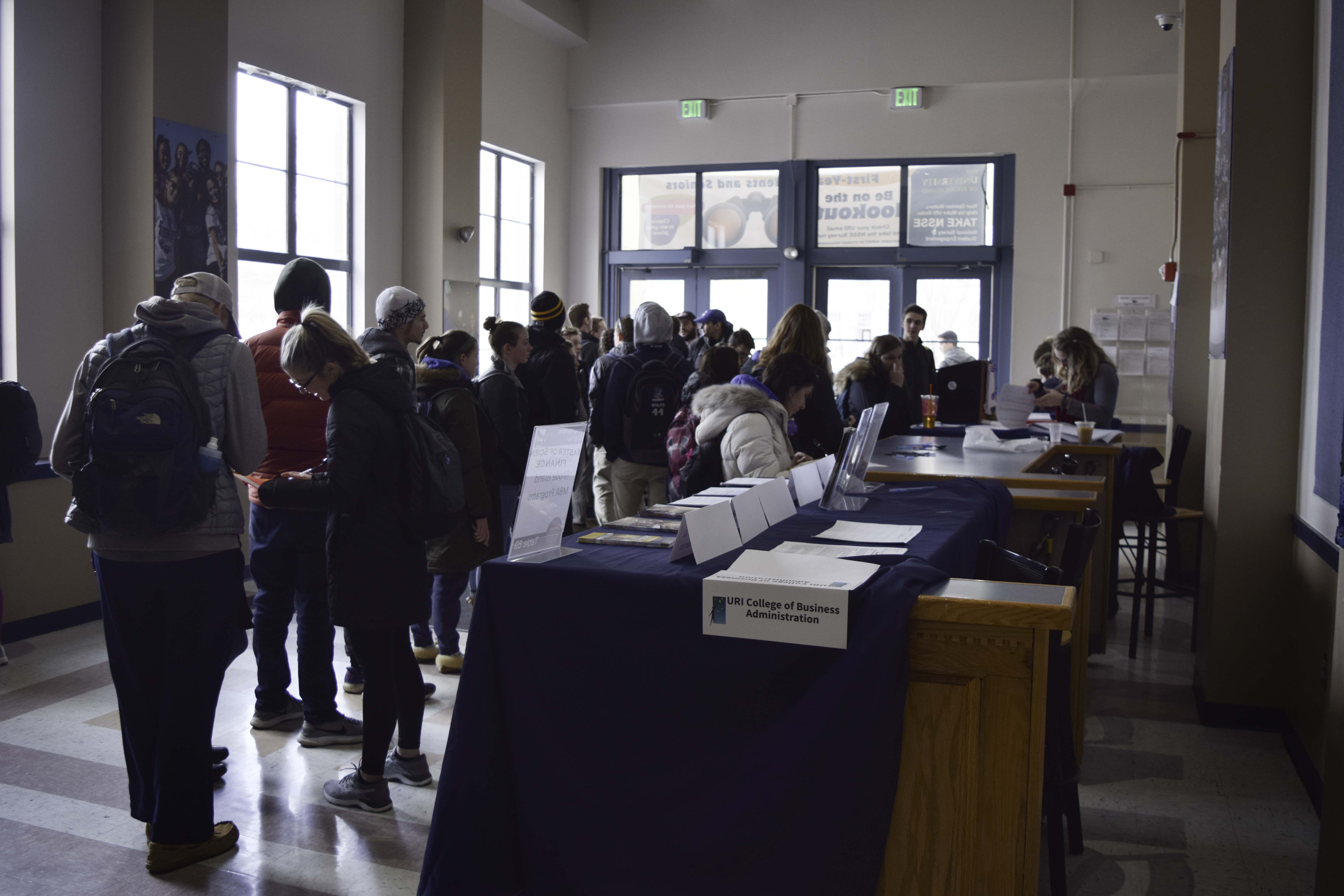Students line up to vote on important topics relating to the university, including one on increased funding for the Club Sports Intramural Council. Photo by Anna Meassick.
University of Rhode Island students voted in favor of a referendum that will add an additional $192,000 to the Club Sports Intramural Council funding, according to Joseph Wilbur, coordinator of club sports.
According to Student Senate Director of Communications Nicolette St. Amand, the referendum was approved overwhelmingly with 988 students voting for it to pass, and 126 voting against it. St. Amand agreed that more funding was needed for club sports.
“I think the amount [of money] that they got has stayed relatively the same over, I would say a decade, even where they’re growing,” St. Amand said. “So it’s just the money that they had wasn’t enough to be able to operate to the caliber of club sports in their conference and in the country.”
According to Joseph Wilbur, coordinator of club sports, all of the around 12,000 full-time martriculating undergraduate students will pay an additional $8 each semester, or $16 each year, in the Student Services Fee in order to increase funding for club sports. This totals to $192,000 more for club sports each year. Each student currently pays a student services fee of $515 each semester according to Student Senate. In addition to the student fee, funding for CSIC comes from club team member fees, alumni donations and fundraisers.
CSIC funds are distributed to each club sport team based on an annual budget process. Some clubs will need more funds than others, especially if they require more equipment or resources. Wilbur said that the new club sports funds will go towards equipment, field rentals, coaching and travel. The Student Senate ballot also lists athletic trainers and practice facilities as included in the funding.
The new funding can also help establish new club sports teams. Wilbur said that groups such as club softball and club baseball had not been approved by CSIC because of an internal rule that says club sports cannot be duplicates of varsity sports. However, Wilbur believes that this rule can change with the new funding.
“It’s our intent to help bring down the costs out of pocket for the students [on club sports teams] and to potentially add more teams into our organization because as of now, there are several teams that are clubs recognize by Student Senate but are not recognized by club sports,” Wilbur said.
Club sports are growing, according to Wilbur. According to URI’s campus recreation website, around 600 students participate in club sports.
“People want to continue playing the sports that they played in high school or when they were even younger than that, at a competitive level and maybe not have the commitment that’s required at the varsity level,” Wilbur said.
Angelica Mirandou, one of the captains of the women’s ultimate frisbee team, hopes that the new funding can help go towards other needs of club sports, such as transportation.
“My club sports team has to drive our own personal vehicles to all of our tournaments and they can be really far away,” Mirandou said. “Driving our personal vehicles takes a toll on our cars and playing ability, because we are tired from driving such far distances to tournaments. It is my team’s hope to utilize buses more in the future to help with these avoidable problems.”
Mirandou also said that the referendum passing will lower the cost of team member dues, and will hopefully attract more players.
“My team has also had a hard time attracting new players because of the cost of dues,” Mirandou said. “My team is small and each year we depend on a decent group of first-year students to join our team just so we can roster as a team.”
Students not involved in club sports had various opinions on the referendum. As suggested by the victory on the ballot, many were supportive.
“It’s fine that we’re paying a little more for club sports,” freshman John Mancini said. “They need transportation, equipment and everything, especially if they need to travel.”
Other students were not comfortable paying for services they do not use.
“People who are involved should just pay the fees,” junior Harry Bond said. “If I have nothing to do with it, I shouldn’t have to pay for it.”
In order to propose the referendum, Wilbur and the student Club Sports President Dominic Campione met with the Student Senate Executive Committee. The entire Senate then met to approve a bill to put the referendum on this year’s ballot.
In 2017, Student Senate placed a similar referendum on the election ballot. Although the majority of voters supported the referendum, with 465 voters supporting an increase in club sports funding with 236 opposing, Student Senate Cultural Chair Jennifer Kohl said that any referendum in the ballot cannot be passed unless the winning side carries 5 percent or more of eligible voters.
St. Amand said that she believes the referendum passed this time because club sports advertised the referendum to others, and encouraged its athletes to vote more than it did in the past. She also believes that the wording of the question on the 2017 ballot was not as clear, so less students voted for it.
“Any organization on campus that wants to get something done through Student Senate or to gauge student opinion should definitely reach out to us to referendums,” Kohl said. “I think that they’re important and I would say that Student Senate is all about representing the student body. And sometimes it’s hard for us, just the 20 of us, to be able to do that. So having referendums are good to kind of gauge if we’re going in the right direction.”

